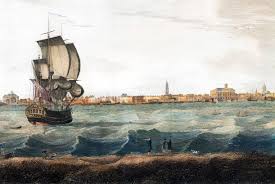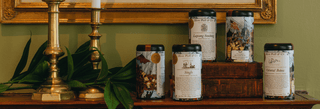Dear Oliver,
The recent rainy weekend left much time for reading, so I have expanded a bit
of the local history for you. On July 4, 2025, The Post and Courier in Charleston, S.C. featured five men who helped lead the nation to independence in the 1700s. Among those was Christopher Gadsden who took a key role in the local South Carolina response to the Tea Act of 1773.

As noted on your Oliver Pluff & Co. site, the Boston Tea Party became much
more famous and ultimately resulted in the loss of copious amounts of tea. But
prior to the events in the North, Gadsden and the local South Carolina Sons of
Liberty had already embarked on a similar protest on Dec. 3, 1773. This group
chose to confiscate and store 257 chests of tea from the British ship London in
the Exchange Building, instead of dumping it into the sea.
Historians report that the decision to store the tea was led by Gadsden and it
was placed in the building at the intersection of East Bay and Broad Streets,
also known as the Old Exchange & Provost Dungeon, which was used for key
meetings and discussions of the time.
The confiscated tea was held for a long seven years before finally being sold to help fund revolutionary efforts. According to the American Battlefield Trust, Gadsden was part of a committee formed at the time to get local merchants on board with the plan to eliminate tea from the East India Company from entering Charleston and he helped
obtain the signatures of 50 merchants who signed the following petition as
reported by the South Carolina Gazette:
“WE the undersigned, inhabitants of this province, being new fully convinced,
that we have vainly flattered ourselves, with hopes of the repeal of an act of
parliament of Great-Britain, passed in the year 1767, imposing a duty on tea
imported from thence, for the purpose of raising a revenue upon us, in America,
without our consent, DO hereby solemnly promise and agree, each for him or
herself, that we will not, either directly or indirectly import, buy or sell, or any
way encourage or countenance the importation, buying or selling, any teas that
will pay the aforesaid duty: And that we will not purchase any goods of any person or persons whosoever, that shall hereafter import, buy or sell any such
teas: And this we do, because we conceive, that the payment of such duties, will
be acknowledging a power which the British Parliament hath assumed, and
which we deny them to have under our excellent constitution, “to tax us against
our consent.”
Gadsden, in addition to his prominent role in the Charleston Tea Party, is also
celebrated for his role as a delegate from South Carolina to the Continental
Congress and for designing the yellow “Gadsden Flag” featuring a coiled snake
and the words “DONT TREAD ON ME.” At the time this was strictly a symbol of
defiance against British rule. Later, Benjamin Franklin would also use the
rattlesnake in his famous cartoon “JOIN, or DIE,” which is featured on your
own Colonial Bohea tea as well as your Oliver Pluff & Co. T-shirts, mugs, and
stickers.

The influence of Gadsden was far reaching in the political arena of the time, as
well as militarily where he led the 1 st South Carolina Regiment at one point.
Thankfully, the tea trade is now alive and well in Charleston, S.C. and shoppers
can find Colonial Bohea and many others at Oliver Pluff’s Tea Shop located at
49 john Street, which is just a short walk from the Exchange Building and
Charleston’s early tea history.




